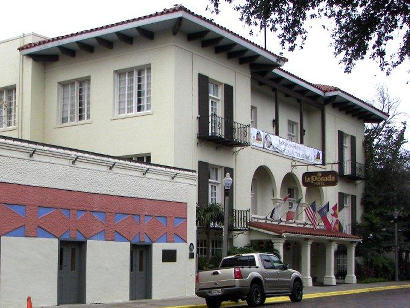|
From
a jet at 24,000 feet, Webb
County looks like a patchwork of mesquite-covered squares, rectangles
and trapezoids, ranchland crisscrossed with unpaved roads of varying
quality called senderos.
Some of these cuts - made for moving oilfield equipment or for the
benefit of deer hunters -- look like giant pale X's scratched across
the brush to passengers aboard the commercial flight approaching Laredo's
busy international airport. Other senderos extend from a central clearing
like spokes on a wagon wheel. Still others look like random hash marks
across the face of the land.
Though laid out in varying angles and with no discernible pattern
to their intersections or parallels, in some way, these senderos always
connect. Follow one and you always will find at least another road.
So, too, is there a sendero-like link between Toronto attorney David
Fasken Sr.'s purchase of 353 sections (a section is 640 acres) of
land west of Midland
in 1913 and the building of a new high school in downtown Laredo
in 1916.
Almost 80 years later, those two disparate developments came to connect
in a venture that altered the urban landscape and social life of the
border city.
But that's getting ahead of the story.
Fasken
acquired his vast holdings in West
Texas from the estate of Nelson Morris, a Chicago meat packing
baron, for $325,000. Proving the verity of the old "buy low, sell
high" adage, the original owner had paid the State of Texas $113,000
for the land in 1883.
After closing on his new property, the Canadian attorney created a
company called the Midland Farms Co. As the name of his company suggests,
Fasken intended to sell the land in small parcels to farmers. However,
he soon realized West Texas
wasn't quite the Garden of Eden. Like his more savvy neighbors, he
turned to cattle raising on what by then was called the C Ranch.
Fasken died in 1929, just as the nation was entering what came to
be known as the Great Depression. To pay the estate taxes, his heirs
had to sell 90 sections of their land in 1932. They lopped the property
in half, leaving a large "fairway" down the better while disposing
of the flanks.
Not long after that, new owner Joe Mabee brought in an oil field on
one portion of the former Fasken land. Then the North Cowden field
and Humble pool came in to the west and north, respectively, and the
Fasken family decided it was time to explore what was left of their
own land.
The Midland Farms Field developed in 1944 and the family started making
a lot more money in oil than they ever did in farming or cattle.
When oil companies started eyeing Webb
County, the Fasken family bought land there and enjoyed further
success in the energy business.
Barbara
Fasken, the ranking family member following the death of David Fasken
Jr., spent a lot of time in Laredo.
She lived downtown, just across from San Agustine Plaza, in an old
house that once had been home to the city's first telephone exchange.
Mrs. Fasken liked Laredo,
but she didn't like that her friends and those who came to Laredo
to do business with her family company did not have a first-class
hotel to stay in.
She was delighted when the old Laredo High School was transformed
in 1961 into the La Posada Hotel. Eventually, the Fasken family bought
the historic property, the city's only remaining downtown hotel. |
 |
Last week, Laredo
city officials and other VIPs cut the ribbon marking the completion
of a $14 million renovation to the 208-room hotel, which sits on the
foundation of a government building dating to Spanish colonial times.
In addition to the old high school, the hotel incorporates another
structure that had been a convent.
"This investment in the hotel reflects our belief in the community
and continued prosperity of Laredo,"
said Norbert Dickman, general manager and since 1982 a co-trustee
of the Fasken estate, now known as Fasken Oil and Ranch, Ltd. "Barbara
Fasken, who was instrumental in buying La Posada, loved Laredo
and spent a lot of her time her. Her legacy is making a large and
lasting impact on the city's hospitality industry and commercial and
residential development."
The
hotel also plays an important part in the city's cultural life, from
spicing up its history with a ghost story (a restless Nun supposedly
haunts the historic hostelry) to hosting weddings, quinceaneras and
most of the events associated with the annual George Washington's
Birthday celebration, an event begun in 1898. |
|
|
Roberto Garcia Junior's 1990 statue of George Washington
TE Photo
More Texas
Statues |
La Posada is
also one of the few hotels anywhere in the nation with two built-in
museums. One, dedicated to the annual February birthday bash for the
father of our country, has a collection of the ornate 100-pound gowns
worn by various "Martha Washingtons" as well as the long coats and
knee pants worn by generations of "George Washingtons."
The other museum, located in an 1830s-vintage structure that once
served as the capital of the short-lived Republic of the Rio Grande,
features exhibits and artifacts related to the 250-plus-year history
of Laredo.
© Mike Cox
"Texas Tales"
November 16, 2006 column |
| Books
by Mike Cox - Order Here |
|
|
